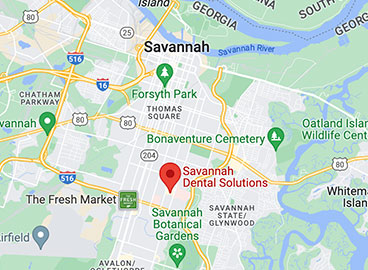What are dental crowns?
Also known as “caps,” dental crowns are a vital tooth restoration option for damaged teeth that can’t be treated with a simple filling. If your tooth is too damaged but still has enough healthy structure, your dentist will repair it and prepare it for a crown. Impressions are taken, and a temporary crown is placed while the final crown is made.
For added convenience, same-day crowns using advanced technology can provide durable porcelain crowns in a single visit, allowing you to leave with a fully restored tooth that seamlessly blends with your natural teeth. Visit us in Savannah, GA, for your restoration needs!
Dental crowns play an important role in modern dentistry, offering a versatile solution for various dental issues. A crown is a cap that covers the entire visible portion of a tooth, providing essential support and protection. Here are a few reasons why you might receive a dental crown:
- Support and protect a large filling: If you have a substantial filling in a tooth, a crown can provide added strength and stability.
- Protect a weakened, cracked, or worn-down tooth: Crowns are ideal for shielding broken teeth or those weakened by extensive decay or wear, ensuring they remain functional.
- Cover a dental implant: Crowns can be placed on top of dental implants, restoring the appearance and function of a missing tooth.
- Secure a dental bridge: Crowns are often used to anchor a bridge, filling gaps caused by missing teeth and restoring your smile.
- Protect at-risk teeth in children: Crowns can help protect primary teeth that are at risk of decay or damage, preserving their health until they naturally fall out.
- Be part of a full mouth reconstruction for TMJ treatment: In comprehensive dental treatment plans, crowns can play a significant role in restoring function and alignment.
Crowns can be made from various materials, including porcelain crowns and ceramic crowns, offering a natural appearance that blends seamlessly with your natural teeth. Whether used as a permanent restoration for a root canal or to cover weakened teeth, crowns are a reliable option for improving both aesthetics and functionality. Discuss your treatment options with our team to find the best solution for your dental needs.
Dental crowns are essential for maintaining and restoring oral health, serving various purposes for patients with diverse dental needs. Here are several reasons why you might receive a dental crown:
- To protect a tooth that is weak or cracked: Crowns provide robust support to prevent further damage to a compromised tooth, safeguarding its integrity.
- To restore a tooth that is broken or worn down: If a tooth has suffered significant wear or breakage, a crown can effectively restore its shape, function, and appearance, covering the entire tooth.
- To hold a dental bridge securely: Crowns are used to anchor fixed bridges, filling gaps left by missing teeth and ensuring stability.
- To cover a dental implant: Once an implant is placed, a crown is attached to replicate the appearance and function of a natural tooth, covering the underlying tooth structure.
- Used as part of cosmetic dentistry procedures or full mouth rejuvenation: Crowns can enhance the aesthetics of your smile, fitting seamlessly with existing teeth to improve overall appearance.
- To cover and add support to a tooth with a large filling: Crowns can reinforce a tooth that has undergone extensive restorative work, ensuring that it can withstand daily functions.
- In children, to protect teeth for various health and hygiene reasons: Crowns may be used to safeguard primary teeth, helping to maintain proper spacing and oral health until permanent teeth emerge.
Initially, a temporary crown may be placed while a custom crown is fabricated, allowing for protection and function until the permanent restoration is ready. Discussing these options with your dentist will ensure you receive the best care tailored to your specific needs, promoting optimal oral health and a confident smile.
As the name suggests, a dental bridge spans a gap where one or more teeth are missing, providing replacement teeth called pontics. There are four types of dental bridges available, each with its own benefits and drawbacks. Your dentist will help you choose the right dental bridge to meet your needs.
- Traditional bridge: Attached at each end to a natural tooth via a crown, traditional bridges remain the most popular style, but are starting to fall out favor due the amount of healthy tooth structure that must be removed to fit the crowns. Traditional bridges are often made of dental porcelain over a metal framework, but can also be crafted entirely from porcelain.
- Cantilever bridge: A cantilever bridge is similar to a traditional bridge, but is attached only at one end. Today, dental implants are more often used to provide additional support, so cantilever bridges are no longer common. However, they can be useful in some specific circumstances.
- Maryland bridge: Less expensive but less aesthetic than a traditional bridge, a Maryland bridge is bonded to the backs of the adjacent teeth rather than supported by crowns. A major advantage of a Maryland bridge is that the healthy tooth structure is not destroyed. An Encore bridge is an all-ceramic Maryland bridge that creates a more aesthetic look.
- Implant-supported bridge: Implant-supported bridges are considered the gold standard in modern bridgework. The adjacent healthy teeth are left undisturbed, as the bridge is anchored by dental implants at each end. This is the most aesthetic alternative, but also the most expensive.
Usually, two visits are required. The first visit will focus on examination of the tooth by Chad Schnabel, DMD. The tooth will also be prepared for the dental crown or permanent crown. On the second visit, the crown or cap will be placed. Any questions you have about the procedure will be answered in the first visit.
First visit: tooth examination and tooth preparation
Dr. Schnabel will make a visual inspection of your mouth and the tooth to be capped. X-rays may be taken to verify the condition of the roots of the tooth and the stability of the surrounding bone. In some cases, existing tooth decay may require additional procedures before the dental crown can be installed. A root canal treatment may be necessary.
Once the tooth is approved for a crown, the preparation of the tooth can proceed. Your tooth and surrounding gum will be anesthetized or numbed. The tooth receiving the crown will be filed on top and on the sides to make room for the dental crown. If you have areas of the tooth that are missing, composite bonding may be used to build up those areas of the tooth.
Please let us know if you experience any dental anxiety and we will be happy to discuss the variety of options related to sedation dentistry.
A paste or putty is used to make an impression of the tooth and surrounding teeth. We want to insure your new crown will not affect your bite. These impressions are sent to a dental lab where the actual crown will be created. This process could take a few weeks.
Second visit: Installing the dental crown
When you arrive for your second visit, Dr. Schnabel will remove the temporary crown that may have been installed. The permanent crown will be checked for size, shape, and color. Again, a local anesthetic will be used and the crown will be cemented on top of the tooth.
On average, dental crowns can last between five and 15 years, depending on various factors, including the type of crown used and the patient’s oral hygiene habits. Proper care is crucial to ensure the longevity of your crown. Maintaining excellent oral hygiene plays a significant role in how long your crown will last, and with diligent care, you can extend its lifespan considerably.
While a crowned tooth is restored to its natural function and appearance, it remains susceptible to decay or gum disease, similar to natural teeth. Therefore, it is essential to brush twice a day and floss once a day, paying special attention to the area along the gum line, where plaque and bacteria can accumulate.
If you’ve received a crown following procedures such as root canals or dental fillings, it’s crucial to understand that the health of your underlying tooth also impacts the durability of the crown. Regular dental check-ups will help monitor the health of both your crowned tooth and the surrounding teeth.
Crowns can be made from various materials, including porcelain, which offers a natural appearance and blends well with your smile. For patients seeking to enhance their appearance or restore functionality, crowns provide an effective solution, helping to achieve a confident and beautiful smile. By committing to proper dental care, you can maximize the effectiveness of your crown and enjoy a restored tooth for years to come.
Dental crown procedures can vary based on your specific situation, and coverage for crowns is assessed on a case-by-case basis. Porcelain crowns are a popular option due to their natural appearance. For added convenience, same day crowns can be custom designed and crafted in just one visit, eliminating the need for temporary solutions. Dr. Schnabel will discuss your current insurance policy and guide you through your options to ensure you understand the costs involved. With his expertise, you can achieve the best treatment for your dental needs, ensuring that your crowns are made to fit perfectly and restore your smile.
Schedule the First Step Toward Your Healthiest Smile


